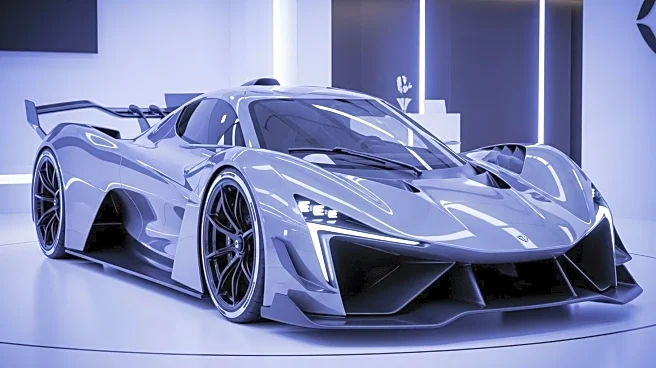What's Happening?
Vittori, an American startup, has introduced what it claims to be the world's first 'AI hypercar' in Miami. The vehicle, designed in collaboration with Pininfarina, features a unique hexagonal grille and a dramatic rear design with angular taillights and quad exhaust tips. The hypercar is powered by a 6.8-liter V-12 hybrid engine developed by Italtecnica, producing 1,110 horsepower. It can accelerate from 0 to 62 miles per hour in approximately 2.5 seconds. Vittori plans to produce only 50 units worldwide, with production set to begin next year in Italy. Pricing details are yet to be announced, but expectations are high for a price tag exceeding $1 million.
Why It's Important?
The introduction of an AI hypercar by Vittori marks a significant milestone in the automotive industry, showcasing the integration of advanced technology in vehicle design and performance. This development could influence other automakers to explore AI-driven innovations, potentially reshaping the luxury car market. The limited production run and high price point position the hypercar as a status symbol, appealing to affluent consumers seeking exclusivity and cutting-edge technology. The collaboration with Pininfarina and Italtecnica highlights the importance of partnerships in achieving technological advancements in the automotive sector.
What's Next?
Vittori's hypercar is expected to enter production next year, with only 50 units available globally. As the automotive industry continues to evolve, other manufacturers may follow suit, exploring AI technology to enhance vehicle performance and design. The market response to Vittori's hypercar will likely influence future developments in luxury and high-performance vehicles. Stakeholders, including competitors and industry analysts, will be closely monitoring the impact of AI integration on consumer preferences and market dynamics.
Beyond the Headlines
The use of AI in automotive design raises questions about the future role of human designers and the potential for AI to replicate the emotional and artistic elements traditionally associated with car design. Ethical considerations regarding AI's impact on employment and creativity in the industry may arise as technology continues to advance. Additionally, the environmental implications of producing high-performance vehicles with large engines could spark discussions on sustainability and the balance between innovation and ecological responsibility.










